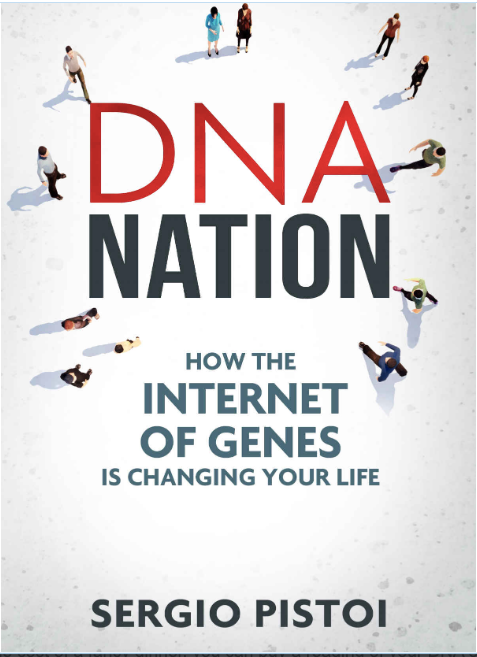
I enjoy binge-watching television series. I think it's a real break-through in our popular culture. I occasionally run into myopic critics of technology in academia, who see bingeing as somehow a debasement of our culture. I always reply that binge-watching a television series brings to the audio-visual screen the same options we have with the venerable medium of the book, which we can read as fast or slowly as we like. And every once in while, I come across a book which indeed demands to be savored, not binge-read. DNA Nation: How the Internet of Genes Is Changing Your Life by Sergio Pistoi is such a book. Accordingly, having read the first part (chapters 1-5) today, I'm going to post this review. And I'll be back, likely more than once, with one or more reviews when I've read the succeeding four parts, like in the next few days (See my reviews of Dreaming the Beatles and The Perversity of Things for two other sequential, much longer, book reviews.)
Pistoi is a molecular biologist, with a philosopher's understanding of human nature and a media theorist's instinct for understanding the evolution and impact of social media. He brings these talents to be bear in a package at turns both sagely and delightfully written, a handbook as much as a book, explaining how the scientific revolution of analyzing our DNA - which can be done for $100 or less, by sending a sample of your saliva - is pulling the rug out from under many of our preconceptions, ranging from where in the world our ancestors came from to who really are our closest and not-so-close relatives? Along the way, DNA Nation eradicates whatever shred of scientific support the 21st racist may cling to, pointing out that DNA mapping shows more differences within racial groups than between them: "you may be more similar genetically to someone you identify as belonging to a different 'race' than your neighbor who looks very much like you" (p. 44).
And Pistoi leavens such weighty lessons with continuous wit and humor. “A genetic profile is not just a biological test," he advises, "it’s a selfie taken from inside our cells” (p. 50). And, "I could couch-surf for decades around the world visiting all my cousins. And if only half of them invited me to family celebrations, I could spend an entire, terrifying life attending marriages, baptisms, first communions, Thanksgiving days and graduations" (p. 18).
Sex, always a good thing to write about, of course figures prominently in this book. Indeed, it's the reason all of us humans are so genetically alike. And it may even extend across species, or does extend across disparate groups of our own species. Did our ancestors actually sleep with Neanderthals? Our current DNA proves it, Pistoi notes, and helpfully adds, "If you have seen a diorama of a Neanderthal you may doubt it, but DNA doesn’t lie, and humans have never been too choosy with sex anyway” (p. 36).
But the thrust of the first part of this essential book is not the several percentages of Neanderthal DNA that some of us carry, but the way knowledge of our genetic profile, combined with the ubiquity of the Internet, has created a new world in which everything from family and friends to ethnic identities are starting to radically change. I'll be back soon with more reviews of this book as I read further about this upheaval in preconceptions in daily progress.
See also DNA Nation (Part 2, Chapters 6-13) The Extraordinary Revolution and Its Intrinsic Limitations ... DNA Nation (Part 3, Chapters 14-17): Two-Edged Swords ... DNA Nation (Part 4, Chapters 18-24, Epilogue): Talkative Cookies
"DNA was the ultimate dossier"

No comments:
Post a Comment